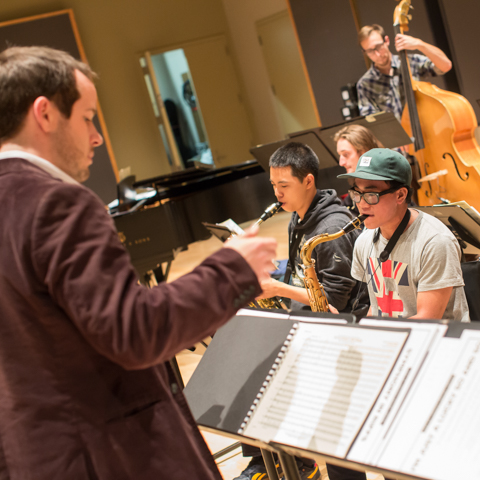Music
Degree Options: Major, Minor
Locations: Lincoln Center, Rose Hill
Visit the Music Department
Moved by harmony and rhythm? This major will be music to your ears.
 Jazz at Lincoln Center. Arts Ensemble concerts in the Bronx. Piano recitals and choral concerts on Fordham’s campuses. The New York Philharmonic and the Metropolitan Opera. Bands at venues all over New York City. As a music major at Fordham, you’ll study music as a force that has shaped culture and as a practical skill, craft, and art.
Jazz at Lincoln Center. Arts Ensemble concerts in the Bronx. Piano recitals and choral concerts on Fordham’s campuses. The New York Philharmonic and the Metropolitan Opera. Bands at venues all over New York City. As a music major at Fordham, you’ll study music as a force that has shaped culture and as a practical skill, craft, and art.
You’ll study a combination of music history, theory, composition, and performance in one of the world’s music capitals. We emphasize careful formal analysis and investigation of the social, historical, and economic conditions driving cultural production. You’ll also compose, score, and perform.
But you’ll learn more than music here. You’ll also study philosophy, theology, history, mathematics, languages, sciences, and the performing arts through Fordham’s common core curriculum, the centerpiece of our liberal arts education.
We want you to excel in your field—and as a human being.
-
As a music major, you take 10 classes—a mix of music theory, performance, and history. We limit our lecture classes to 35 students to promote dialogue and debate.
Some of our students combine the music major with another field of study. Those interested in artist management or the music industry might double major in music and economics or business.
Internships
We connect you with music internships at recording companies and concert agencies throughout New York City.
Fordham’s Career Services offers CareerLink, database of thousands of job and internship opportunities exclusively for Fordham students.
Study Abroad
Study abroad enriches you academically, culturally, and personally. There is a globe of possibilities available through Fordham’s International and Study Abroad Program.
-
Introduction to Opera
Music Before 1600
Broadway Musicals
Music Composition
Music, Enlightenment and Revolution
Jazz Theory and Notation
Rock and Pop Music Since WWII
Musicianship I: Counterpoint
Musicianship II: Diatonic Harmony
Musicianship III: Chromatic Harmony
Basic Keyboard
Piano Lab -
A music degree can take you many places in the performing arts. Many of our students pursue careers in the recording industry, educate others, combine music with another field of study, or attend graduate school. Some of the many options:
- Accompanist
- Agent
- Artist manager
- Audio production
- Composer
- Copyright consultant
- Audio engineer
- Studio manager
- Music historian
- Merchandising
- Music librarian
- Session musician
- Promoter
- Radio programmer
- Recording engineer
- Sound designer
- Booking agent
- Tour publicist
Get a job, right? Yes, but you want more: a career. Our career services tap Fordham’s ties with more than 3,500 companies. We offer:
- postgraduation career search
- resume development, Interviewing practice
- networking skill development
- hands-on case-study sessions with industry executives
- field-specific advising/coaching
You also get access to our powerful (and Fordham-loyal) alumni network, who want to see you succeed as they have.
Learn More About the Music Degree